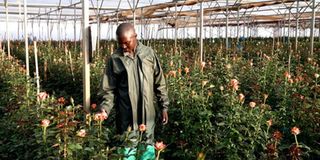Hard times ahead after EU’s red flag on Kenyan produce

Red Land Roses growing in a farm in Kiambu County. Cut flowers will suddenly be subjected to tariffs of 8.5 per cent, Fish will attract 6 per cent, pineapple juice and other fruit juices from Kenya will cost 11.7 per cent more for European clients. PHOTO | SALATON NJAU | FILE |
What you need to know:
- The ministry of agriculture is said to have held crisis meetings, including one on Monday, chaired by Cabinet Secretary Felix Koskei.
- Investigations by Saturday Nation reveal that the Kenya Plant Health Inspectorate Service has suspended export certificates for farmers in Meru and Kirinyaga pending an audit of their production systems.
Anxiety has gripped the multi-billion Kenyan horticulture industry after the European Union expressed worry over five popular products.
The union claims mangoes, karella (bitter gourd), the popular cooking herb, basil, as well as gypsophila and eryngium flowers, have a heavy presence of organisms and pesticides.
Investigations by Saturday Nation reveal that the Kenya Plant Health Inspectorate Service has suspended export certificates for farmers in Meru and Kirinyaga pending an audit of their production systems.
The five crops are said to have heavy presence of noisome organisms such as fruit flies, leaf miner and thrips.
Sources revealed that things could get worse after some farmers were advised not to grow certain crops — outside of the five — until next month when a key European Union meeting will decide Kenya’s fate. This will be heavy losses for farmers whose crops are in the field.
CRISIS MEETING
The ministry of agriculture is said to have held crisis meetings, including one on Monday, chaired by Cabinet Secretary Felix Koskei.
The situation could get even grimmer with officials intimating that the European Union meeting could return a damning verdict on Kenya. This means only non-edible crops such as flowers could survive, which spells doom for small-scale farmers who don’t grow flowers.
Kephis managing director James Onsando on Thursday said the government had sent an action plan to the EU outlining how it intends to manage the problem that threatens the top foreign exchange earner that fetched Sh93 billion for Kenya last year alone.
Ninety per cent of Kenya’s horticulture revenue comes from Europe. “If by September 30 we are still performing very dismally, then the EU will be forced to take action, meaning, we may lose the segment of the market we have been supplying,” Dr Onsando said.
“We know exactly who is responsible for the situation Kenya finds itself in,” Dr Onsando said, as he blamed the crisis on what he described as ‘dodgy exporters’ out to make quick money.
QUICK RECOVERY
Dr Onsando singled out Meru and Kirinyaga—major sources of podded peas and French beans respectively—for being notorious for exporting produce that contravenes EU regulations.
Meru region is already reeling under the UK ban on miraa, and can ill-afford to run afoul of the EU over the legumes and bitter guards.
Dr Onsando, however, declined to name particular offenders, citing confidentiality and legal repercussions.
Kephis has not had problems with produce from the Kinangop sub-county of Nyandarua County, a major source of horticultural produce including peas and sugar snaps, he said.





